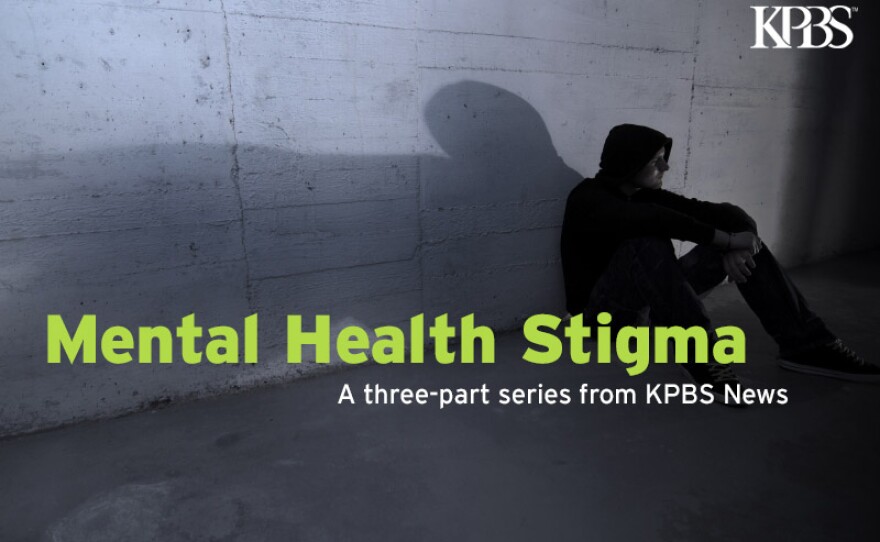This is the third of the three-part series.Family-To-Family
On a recent weekday evening at San Diego’s St. Mary Magdalene church, a group of people gathered for a crash course on mental illness.
Instructor Paul De Martini called the class to order.
“OK, we want to welcome you to the opening class of NAMI Family-to-Family education. We are very excited that this day has finally come, and we can be together," he said.
NAMI stands for the National Alliance on Mental Illness. Their Family-to-Family program is a twelve-week course that aims to give people a better understanding of mental illness.
The course is offered nationwide and in Canada and Mexico. More than 300,000 people have taken it.
De Martini told the audience that over the next couple of months, they'd learn some coping skills, communication techniques, and strategies for dealing with a crisis.
“It’s the essence of what NAMI is about, which is really family members helping, supporting, and guiding one another through the incredible challenge of mental illness," he said.
Part One: For Those With Mental Illness, Battling Stigma Is First Step In Getting Help
Part Two: Stigma Against Mental Illness Is Built Into Health Care System
For Fisher, It's Personal
Everyone in the room had a family member with a serious mental illness, including Anita Fisher. She’s the director of education for the local NAMI chapter.
When her son was 21, he was diagnosed with schizophrenia. He was discharged from the Army and came back to San Diego.
“And then I didn’t want to tell anyone," Fisher recalled. "So, we had our own sort of self-stigma, because it was this mental illness, OK? We knew it fell under that category of mental illness, and that’s not something that you talk about a lot.”
Fisher and her husband didn’t know what to do.
But when their son became homeless and started to self-medicate with drugs and alcohol, Fisher knew that they had to do something.
She heard about NAMI and decided to give them a call.
“I thought they were gonna say, ‘Oh my goodness, I’ve never heard that before in my life’, but they didn’t," Fisher remembered. "They said, ‘I understand, I’ve had some of that in my own life.’"

Fisher and her husband took the Family-to-Family course. It made them realize that mental illness affects tens of millions of families. And it helped them get over their own biases about their son’s condition.
NAMI isn’t the only organization trying to fight the stigma against mental illness.
The San Diego County Health and Human Services Agency has an active anti-stigma campaign called It’s Up to Us.
Cal State San Marcos Fights Stigma
And Cal State San Marcos is trying to do its part. The school is engaged in a year-long effort to destigmatize mental illness.
Last Halloween, the campus hosted a mental health fair.
The event featured booths staffed by mental health providers, and an exhibit, Real Monsters, by British artist Toby Allen.
Each of Allen’s colorful illustrations depicts a mental health condition as a grotesque monster.
Sophomore Melissa Munoz said she got it.
“I think they’re trying to show how all these disorders they can be very, like dangerous or malevolent, or they can really be seen as monsters to other people that destroy other human beings,” she said.
Becky Calica works with the campus chapter of a national group called Active Minds. The group encourages students to talk about mental health challenges.
Calica admitted it’s not easy.
“I’ve experienced anger and anxiety, but I never knew how to talk about it," she explained. "It’s quite like feeling like you’re screaming on the inside, but no one can hear you. And you shouldn’t be screaming on the inside, you should be talking about it out loud.”
Cheryl Berry, the school’s mental health educator, has spent years fighting the stigma against mental illness.
She tells students when someone breaks their arm, they don’t try to take care of it on their own — they see a doctor.
“And at the same time," Berry said, "We should feel that we can address our emotional and mental health issues by going to see a therapist, or a counselor, or a psychologist or psychiatrist.”
Education Is Key
Anita Fisher believes education is the key to ending stigma. She feels so strongly about it that she left her career as a banking executive to work for NAMI.
Fisher said we need to normalize mental illness and stop blaming people who need help.
“My son didn’t go out and catch mental illness," she pointed out. "He didn’t know this was coming, and we didn’t know this was coming. And somehow, we’ve been treated as though it’s his fault.”






